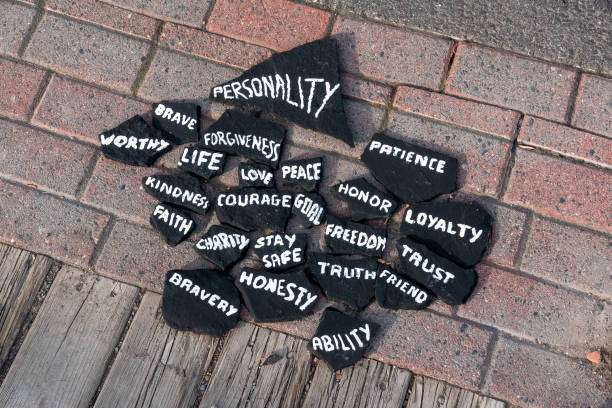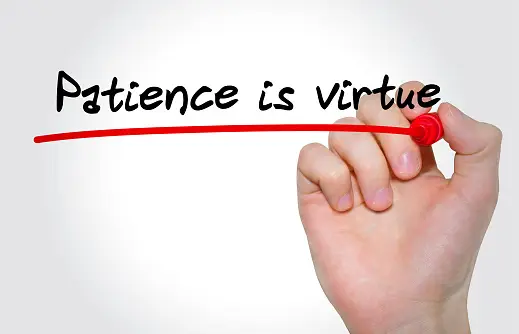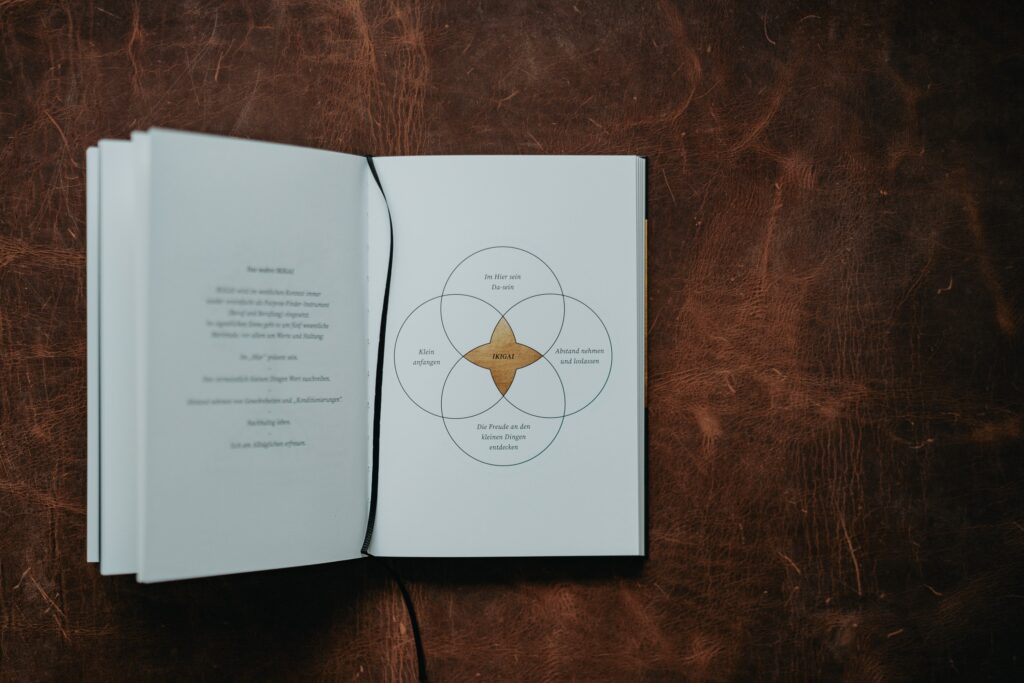“Learning patience can be a difficult experience, but once conquered, you will find life is easier.” — Catherine Pulsifer
Jump to section
You see, we live in this contemporary world, where we want more and we want it instantly. Somewhere in the collective mindset, there’s an ingrained belief that once we establish a goal, we should be achieving it straight away. And when we closer look at this theory, it actually seems quite illogical. Whether one’s objective is establishing a sleep routine for a child, cultivating a calm demeanor, securing financial stability, planning a holiday, or simply taking a well-deserved break, there always exists a significant duration between setting the goal and its actual achievement. In this intermediary period, the virtue of patience becomes most important.
Patience is a virtue meaning
“Patience is a virtue meaning” that many of us are trying to understand and put into practice in our day-to-day lives. Think of it like a muscle — the more you work it out, the stronger it gets, according to Debra R. Comer, Ph.D.
Practicing patience gives us the opportunity to regain composure and to offer both ourselves and others grace during difficult moments when it’s most needed. Holding patience means we avoid thoughtless reactions to minor irritations and inconveniences, granting us the liberty to respond with kindness and gentleness. Throughout various religions and moral traditions, patience has been upheld as one of the most esteemed virtues.
Usually, this virtue becomes more important when dealing with challenges and interacting with sensitive people. Patience teaches us to be kind across diverse situations, develop communication skills to dispel misunderstandings, and build trust. Patience rewards us to live according to our own rhythm and style. It’s an exceptional grace we offer in the most commonplace situations.
Maintaining patience helps us to maintain a balanced perspective. When we practice patience during challenging circumstances, we come to recognize these situations as minor hurdles that we have to accept. Without patience, these scenarios can easily become overwhelming, followed by frustration and anger. Just a little bit of patience helps us to break our old habits of reacting mindlessly, which often cause various problems.
7 Benefits of patience

The advantages of applying patience help us in various facets of life. Whether it’s waiting in line at the bank or dealing with complex projects at work, the benefits of patience become evident in these routine scenarios.
Consider these 7 benefits of patience:
1. It empowers us to maintain our focus on long-term goals without getting discouraged by immediate setbacks. It builds a mindset that values the journey toward achieving those aspirations, acknowledging that some goals require time and consistent effort.
2. Patience allows for a more deliberate approach to decision-making. By not rushing into choices impulsively. You can weigh the pros and cons, consider different perspectives, and analyze potential outcomes, leading to more sound and balanced decisions.
3. Patience encourages us to persist in our endeavors, face challenges, and maintain a positive attitude, despite setbacks or difficulties.
4. You can pave the way for a more effective learning process. It supports the learning journey, embracing the gradual progress that accompanies acquiring new competencies.
5. You can enhance your ability to listen attentively. By patiently hearing others without rushing to respond, people can fully grasp and understand different perspectives, key to more meaningful and empathetic communication.
6. When you exemplify patience, you contribute to creating a space where others feel listened to, appreciated, and esteemed. It creates a comfortable and supportive environment for others.
7. When you approach situations with patience and understanding, you can alleviate stress, ultimately leading to a more serene and fulfilled life. This virtue builds a positive mindset that remains composed amidst life’s inevitable challenges, contributing to a calmer and more balanced lifestyle.
7 Easy Tips for Being a More Patient

Mastering patience can be challenging, but experts suggest these tips to help you get better at it.
1. Reframe the situation
Take a moment to reconsider the situation. Sometimes, a change in perspective can transform how we perceive and feel about certain circumstances. When you are faced with a frustrating situation, take a moment to think about why it affects you. Understanding the root cause allows you to reframe the problem, making it less burdensome.
Suppose you’re in a situation where you’re unexpectedly waiting for a friend at a coffee shop. Take it as an opportunity to unwind by enjoying a book or catching up on some pending emails. Use those free moments to listen to a podcast or music that brings relaxation, and transforms the waiting time into a positive and enjoyable break.
2. Prepare yourself before difficult situations
The next most valuable hack for you is to anticipate situations that may test your patience and get ready in advance. Understand that difficulties or delays might arise, and not everything will go according to plan. By setting realistic expectations, you can reduce the shock of unexpected events, thus building a more patient attitude.
Try to see situations from other people’s perspectives. This can help in reducing frustration by understanding others’ viewpoints or the reasons behind delays or challenges. Instead of focusing on the issue at hand, try to find solutions. This proactive approach helps in directing your energy towards resolving the situation rather than getting frustrated by it.
3. Think about the big goals
Keeping in mind your higher purpose or goals can also help you cope when you’re feeling frazzled, says Schnitker.
A purpose linked to a cause you deeply care about, such as saving up for a home for your family or striving to achieve a professional goal, can provide significance to the challenging aspects of your job. Even during difficult moments that might prompt you to question why you don’t choose an easier path, having a goal tied to a cause you believe in can infuse those tough times with greater meaning and motivation.
In a study published in the Journal of Personality in 2020, Schnitker studied nearly 400 Americans aged between 12 and 22 who were engaged in training for a charity marathon in Chicago and Los Angeles. Those who are preparing for the marathon to raise funds for providing clean water to schools in Africa exhibited more commitment to their regular training sessions compared to those who had signed up with the sole aim of improving their fitness.
“Think about your purpose even when you’re not upset so that it’s always accessible to you,” Schnitker says.
4. Monitor your Progress

Regularly take time to pinpoint the areas of your life that demand more patience and consistently assess your progress. For instance, you might decide to work on exercising more patience with your children and partner.
One method to track your progress involves keeping a simple record. Use apps or physical trackers to record your daily progress. You can use simple tick marks to note instances where you responded with patience or lost it, giving you a visual representation of your progress. By tallying these instances throughout the week, you can assess your improvement in managing your reactions. Ask for feedback from trusted friends or family. Inquire about your patience improvements and areas where they think you could work on being more patient.
“The more you practice patience and forgive yourself when you slip up, the sooner you’ll start to catch yourself in the moment. Eventually, it becomes automatic.” Rayan says.
5. Start by taking small steps and staying committed.
The journey toward greater patience, as suggested by Dr. Sweeny, begins with small victories. Celebrate the little successes, such as successfully waiting in line at the grocery store for 10 minutes without feeling agitated or choosing to take a walk instead of sending a passive-aggressive email.
Dr. Sweeny advises against attempting to implement these strategies for the first time during a conflict or argument, particularly with a partner.
Patience is not an attribute that transforms overnight. According to Schnitker, noticeable changes might occur within as little as four weeks for some people. However, the progression is incremental and varies for each person. Developing this incremental shift and staying committed to the process is key, allowing for gradual but lasting changes over time.
6. Slow down
Your perceived deadlines might not be as inflexible as they seem. If you consistently find yourself running late, it might be time to reconsider and adjust your schedule. Allocate a few extra minutes for each task, evaluate what you can potentially remove from your to-do list, or consider waking up just 15 minutes earlier. You’d be amazed how much of a positive impact these small adjustments can make on your routine. Otherwise, you run the risk of either delivering subpar work or succumbing to the pressure of the moment.
According to Lite, “We get so caught up in hurrying that we get stuck in that mode,” “But most adults do not feel happy when they’re rushing, and children are even less capable of doing it with a good attitude.” Instead of sweating through your tasks, try playing some background music you enjoy and aim to move at a normal relaxed pace.
7. Balance your professional and personal life
You might be imposing excessive pressure on yourself to work alone in the workplace. Most workplaces involve collaborating with a different range of people, each with their unique characteristics and working styles. This diversity is a gift – if you approach it appropriately. You can learn more and achieve better success compared to working in isolation or with a homogenous group. However, adopting this mindset and effectively working together demands significant energy, time, and patience.
Remember, all work without relaxation can make you impatience person. It’s important to carve out time for rest. Stop to engage in negative self-talk and consciously choose to adopt a positive perspective in all situations. If you don’t do this, it can be challenging to develop self-love and attract positivity from the world. Show yourself you are your best friend.

Related Posts:
51 Amazing Patience Is a Virtue Quotes For Perfect Life
9 Books on Patience That Will Change Your Perspective
Treat people with kindness: Easy 75 Tips
Kindness Matters: 11 Reasons Why Is It Important
Recommended Posts:
Focus on Yourself: 21 Surprising Ways to Help You
“Talent(Our Hidden Gem): The Ultimate 8 Ways to Find It”
How to Express Emotion & 7 Ways to Control Negative Emotions



